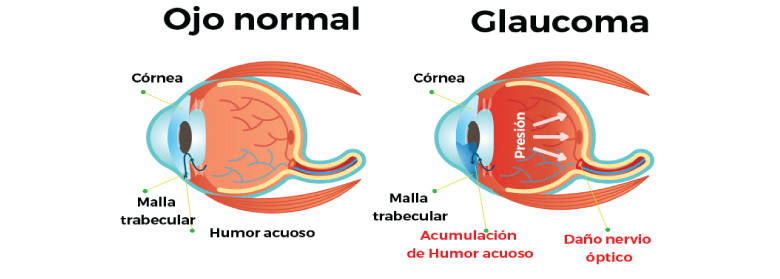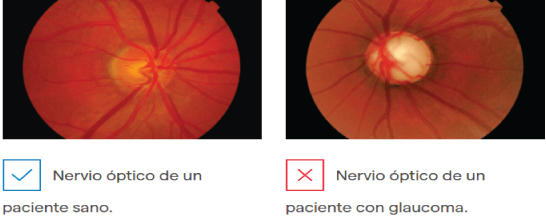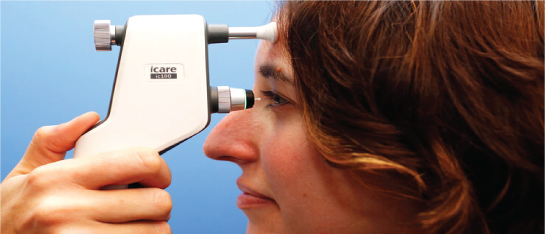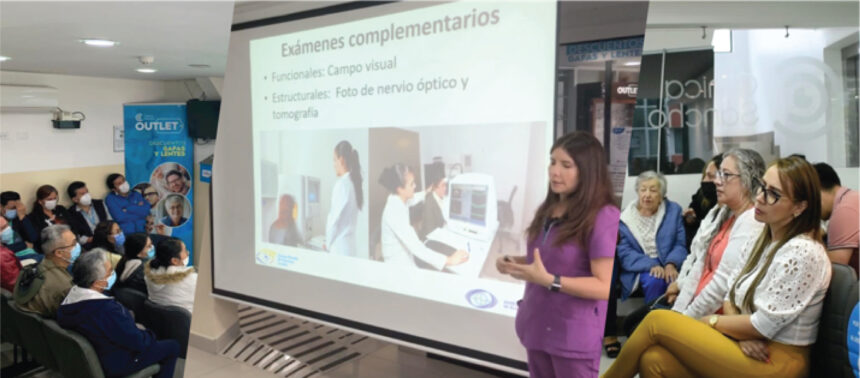Every year, during the month of March, Glaucoma Week is celebrated. This year, from March 10 to 16, Clínica Sancho was proud to organize a series of educational talks on the 13th and 14th. With the valuable participation of Dra. Ligia Sancho, expert in ophthalmology and advocate of visual health, They addressed crucial aspects for the prevention and care of glaucoma, highlighting the importance of preserving vision.
Glaucoma is an eye disease that affects the optic nerve and, if not treated in time, can lead to irreversible vision loss. It is vital to understand how to prevent and detect this condition in time to maintain visual health. In this article, we will explore the importance of glaucoma prevention and how to care for our eyesight.
In this occasion, we conducted several radio interviews where Dra. Ligia Sancho highlighted the importance of preventing glaucoma, known as “the silent thief of vision.” You can see more details at the following link: https://www.youtube.com/watch?v=jM4m-VEO-RQ

Understanding Glaucoma
Glaucoma is a silent disease that can affect people of all ages, but is more common in older adults. It is characterized by increased intraocular pressure, which gradually damages the optic nerve. Symptoms are often not evident in the early stages, making it crucial to perform regular eye exams to detect any signs of glaucoma early.
Ophthalmological advice
- Regular Eye Exams: Schedule regular eye exams, especially if you have a family history of glaucoma or risk factors.
- Glaucoma Awareness: Educate those around you about the importance of this eye disease and the need for regular exams to detect it early.
- Early Treatment: Seek immediate medical attention if you experience vision changes, severe eye pain, or any concerning symptoms.
- Intraocular Pressure Control: Keep intraocular pressure under control through regular measurements and follow your ophthalmologist’s recommendations.
- Healthy Lifestyle: Adopt a diet rich in antioxidants, low in sodium and saturated fat to promote eye and cardiovascular health.
- Avoid Tobacco: Smoking increases the risk of developing glaucoma. Quitting smoking can help protect your eyes.
- Sun Protection: Wear sunglasses with UV protection to protect your eyes from damage caused by ultraviolet radiation.
- Regular Exercise: Maintain an active lifestyle with regular physical exercise, which helps improve blood circulation and reduce intraocular pressure.
- Stress Control: Manage stress through relaxation techniques such as meditation, yoga or recreational activities that you enjoy.
- Comply with Medical Treatment: If you have been diagnosed with glaucoma, strictly follow your ophthalmologist’s instructions regarding treatment and prescribed medication.
Types of Glaucoma and Prevention
Dra. Ligia Sancho emphasizes the importance of raising awareness about glaucoma and ensuring adequate treatment to avoid blindness. It explains that glaucoma is a degenerative disease that affects the optic nerve, causing the death of nerve fibers and the interruption of information to the brain. Describes how increased aqueous humor production can raise intraocular pressure, leading to optic nerve damage. This glaucoma disease is known as “the silent thief” because it can progress without obvious symptoms. The different types of glaucoma, including open-angle, closed-angle, and congenital. It highlights the risk factors associated with this disease, such as advanced age, family history, ocular hypertension and diabetes. In addition, it offers practical tips to prevent glaucoma, such as having regular eye exams, maintaining a healthy lifestyle, avoiding tobacco use, and protecting your eyes from the sun.

Diagnosis and Prevention of Glaucoma
Glaucoma specialist Dr. Byron Sancho offers a detailed guide on how glaucoma tests are performed to detect the disease in its early stages. It highlights the importance of tonometry to measure intraocular pressure, as well as the evaluation of the optic nerve and the fundus. Furthermore, it highlights the need for a complete visual examination to detect any signs of glaucoma. It also provides additional tips on prevention.

Conclusions
- Glaucoma is a serious eye disease that can affect our quality of life if not treated in time. However, with proper prevention and regular eye care, we can significantly reduce the risk of developing this condition. It is essential to follow the advice of specialists and perform regular ophthalmological examinations to keep our eyes healthy and prevent glaucoma.
- Ultimately, taking care of our eyesight is a responsibility that we must assume to enjoy a full life without visual limitations. We should not underestimate the power of prevention and ophthalmic care in preserving our vision and quality of life in the long term.
- Remember, the health of your eyes is invaluable; Don’t wait until it’s too late to take care of them!

